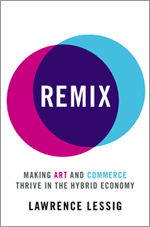On Thursday, June 9, The Colbert Report featured Lawrence Lessig, law professor, founder of Creative Commons, advocate for copyright reform, and evangelist for what he terms the “hybrid/mash-up economy,” a system that permits commercial ventures to benefit from and contribute to an open exchange for creative content unencumbered by traditional copyright restrictions. The episode re-aired last night, and the web site of The Colbert Report now features a notice, complete with the logo for Lessig’s new book, Remix, stating that his publisher, Penguin, has requested that Remix be removed from the site.

Throughout Lessig’s appearance, Colbert ably poked fun at the writer’s ideas while also showing that the Report relies on many of the same notions advanced in the book: the cultural value of parodic and derivative works; adding economic and cultural value to existing works and being able to profit from it; opening up culture to the kind of democratic, participatory level available before the advent of recorded music and now championed by Wikipedia and Flickr’s sharing community. As Colbert mentioned, he often launches “green screen challenges” and other events that solicit audience members to create parodic, YouTube-style works based on existing footage (such as news footage of John McCain’s notoriously dry speech in New Orleans on the night Barack Obama clinched the Democratic nomination). Colbert, in turns, shows a selection of these videos, adds value to them by contributing his own wit and commentary, and profits by marketing and presenting them to a wide audience.
Offering this dichotomy as something other than what it actually is and claiming ignorance of any distinction is the sort of obvious hypocrisy that forms one of Colbert’s most common humorous tropes. It’s also what makes him devastatingly effective. He may seem like a Bill O’Reilly moved to the right of Attila the Hun, but as long as Colbert claims ignorance of what he’s doing as being anything but sincere, and is funny while doing it, it’s difficult to call his bluff. But the satirical overtones of the show, its overwrought diction, its occasionally beyond-the-pale claims (like the repeated warning that bears are a mortal threat to society), and its being clearly plugged into the cultural zeitgeist—employing YouTube videos, having its own vibrant, video-heavy web site, writing commentary deftly derived from a wide selection of news and blogs stories—show that Colbert is as on the cutting edge of what is hip and relevant as any show host out there. Or rather, he attempts to define popular taste, acting as a discerning, value-adding filter for the great hordes of user-generated content out there, just like any Web 2.0 brand that draws curated selections from the bottomless well of mass culture, user-generated and otherwise (see: Huffington Post, Drudge, The Daily Beast, Yahoo News, Gawker Media, innumerable other small entities and blogs, many with thousands of followers). Of course, his character would have us believe that he’s rather oblivious to this fact, even while he winks at us from behind the mask.
So, in the end, is the notice of the removal of Lessig’s video a small, ironic joke, courtesy of Lessig, Penguin, and The Colbert Report? (Likely so, as both the full episode and a clip of Lessig’s appearance are still available on the site.) After all, an advocate of shared culture and easing copyright protections has presented his book, copyrighted and sold by a corporation that profits from extended copyright protections, on a TV show that in turn is owned by a corporation, Viacom, that has vociferously guarded its ability to profit from displaying its own videos online by suing YouTube. But, adding another layer of complexity, the host of one of Viacom’s most popular shows routinely satirizes his supposed corporate overlords and subtly encourages his devoted, creative, technologically plugged-in fan base to create derivative works based on his show material and to post them online. Head exploding yet? The Daily Show has provided on-point, hilarious satire about this Möbius-like web of connections. (Lessig has commented about Viacom, saying that they’re open to remixes but want to protect the content of full episodes.)
The final irony—which all adds up to a sort of extended commentary that could be called Colbert’s buried editorial line—is that Stephen Colbert is exactly what Lawrence Lessig wants and tries to defend. That’s why he’s on the show. Colbert often, as described above, creates, adds to, and derives economic value from others’ cultural works (though generally skewed towards the pop cultural side of the spectrum). He is part of the Creative Commons-inspired culture model in which disparate groups can come together, collaborate on work, profit from it, and relinquish it to others so that they may have the same opportunities. Many, though perhaps not most, of the 70 percent of kids who illegally download media do the same thing. But of course, the added genius of Colbert is that he would rather us think he doesn’t know that. It’s more clever—and more entertaining—if he appears to be a contrarian, reactionary, right-wing doofus while still tapping into these cultural movements. So when Colbert pulled out a Sharpie pen, began writing and drawing all over Lessig’s book, and joked that he was “adding value” to it, he knew exactly what he was doing. He, by virtue of his celebrity and marking up a book, added value to the existing work—and Lessig agreed and supported him. Certainly the book would fetch more on eBay than its $25.95 cover price.
But is Lessig, by virtue of relying on a major corporate publisher like Penguin, able to follow his own mantra? He’s said that his book will be available through a Creative Commons license, but Bloomsbury Academic says that Penguin has locked up electronic publication rights through May. If you crack open a copy of “Remix,” you’ll find a familiar sight: ”Copyright Lawrence Lessig, 2008. All rights reserved.”






